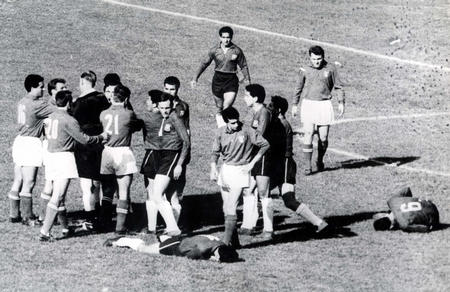Portal:Association football
| Main page | Categories & Topics | WikiProjects & Things you can do |
The Association football portal

Association football, more commonly known as football or soccer, is a team sport played between two teams of 11 players each, who almost exclusively use their feet to propel a ball around a rectangular field called a pitch. The objective of the game is to score more goals than the opposing team by moving the ball beyond the goal line into a rectangular-framed goal defended by the opposing team. Traditionally, the game has been played over two 45-minute halves, for a total match time of 90 minutes. With an estimated 250 million players active in over 200 countries and territories, it is the world's most popular sport.
The game of association football is played in accordance with the Laws of the Game, a set of rules that has been in effect since 1863 and maintained by the IFAB since 1886. The game is played with a football that is 68–70 cm (27–28 in) in circumference. The two teams compete to score goals by getting the ball into the other team's goal (between the posts, under the bar, and fully across the goal line). When the ball is in play, the players mainly use their feet, but may also use any other part of their body, such as their head, chest and thighs, except for their hands or arms, to control, strike, or pass the ball. Only the goalkeepers may use their hands and arms, and that only within the penalty area. The team that has scored more goals at the end of the game is the winner. There are situations where a goal can be disallowed, such as an offside call or a foul in the build-up to the goal. Depending on the format of the competition, an equal number of goals scored may result in a draw being declared, or the game goes into extra time or a penalty shoot-out.
Internationally, association football is governed by FIFA. Under FIFA, there are six continental confederations: AFC, CAF, CONCACAF, CONMEBOL, OFC, and UEFA. Of these confederations, CONMEBOL is the oldest one, being founded in 1916. National associations (e.g. The FA in England) are responsible for managing the game in their own countries both professionally and at an amateur level, and coordinating competitions in accordance with the Laws of the Game. The most prestigious senior international competitions are the FIFA World Cup and the FIFA Women's World Cup. The men's World Cup is the most-viewed sporting event in the world, surpassing the Olympic Games. The two most prestigious competitions in club football are the UEFA Champions League and the UEFA Women's Champions League, which attract an extensive television audience worldwide. The final of the men's tournament is the most-watched annual sporting event in the world. (Full article...)
Selected article
Founded in 1902, Norwich have played their home games at Carrow Road since 1935, a ground that was constructed in just 82 days. Its record attendance of 43,984 was achieved in 1963 for an FA Cup game against Leicester City. Following new legislation and redevelopment into an all-seated stadium, its current capacity is 26,034.
The club have a long-standing rivalry with East Anglian neighbours Ipswich Town, with whom they contest the East Anglian Derby. Other teams in the area also compete with Norwich for the informal Pride of Anglia award. (Full article...)
Selected biography
Fàbregas started his career as a trainee with FC Barcelona but signed by Arsenal in July 2003 looking for regular first team football. He did not feature much in his first season for the Gunners, but following injuries to key midfielders in the 2004–05 season, his playing time increased. Before long, he had established himself as Arsenal's starting central midfielder and playmaker and went on to break several of the club's records as he began to earn a reputation of a technically-gifted player, excellent passer of the ball and key component of the Arsenal lineup.
In international football, the Spaniard's national career began at the youth level, representing the Under-17 side at the 2003 FIFA U-17 World Championship in Finland. As a result of his club performances, he was called up the senior Spanish national team and played in the 2006 World Cup. (Full article...)
Selected association

The Oceania Football Confederation (OFC) is one of the six continental confederations of international association football. The OFC has 13 members, 11 of which are full members and two which are associate members not affiliated with FIFA. It promotes the game in Oceania and allows the member nations to qualify for the FIFA World Cup.
OFC is predominantly made up of island nations where association football is not the most popular sport, with low GDP and low population meaning very little money is generated by the OFC nations. The OFC has little influence in the wider football world, either in terms of international competition or as a source of players for high-profile club competitions. OFC is the only confederation to have not had at least one international title, the best result being Australia making the final of the 1997 FIFA Confederations Cup. (Full article...)
Did you know (auto-generated) -

- ... that Carlton Town F.C., now competing at the eighth tier of the English football pyramid, was once denied promotion by a hat-trick scored by future England international Jamie Vardy?
- ... that Ryan Roberts, a defensive end for Notre Dame, was a soccer player in high school?
- ... that goalkeeper Sophie Whitehouse, who has lived in England, Africa and the US, has been chosen to play soccer for the Republic of Ireland?
- ... that Ecuadorian footballer Hernán Galíndez won a bicycle for beating a team featuring Lionel Messi when they were children?
- ... that after his soccer career, Steve Palacios enlisted in the United States Army and played for the United States Armed Forces soccer team?
- ... that Welsh footballer Jon Morgan went on to become a college principal after retiring?
Selected image

Selected quote
General images -
Selected World Cup
The 1991 FIFA Women's World Cup was the first FIFA Women's World Cup, the world championship for women's national football teams. It took place in Guangdong, China from 16 to 30 November 1991. FIFA, football's international governing body selected China as host nation as Guangdong had hosted a prototype world championship three years earlier, the 1988 FIFA Women's Invitation Tournament. Matches were played in the provincial capital, Guangzhou, as well as in Foshan, Jiangmen and Zhongshan. The competition was sponsored by Mars, Incorporated, maker of M&M's candy. With FIFA still reluctant to bestow their "World Cup" brand, the tournament was officially known as the 1st FIFA World Championship for Women's Football for the M&M's Cup.
It was won by the United States, whose captain April Heinrichs formed a forward line dubbed the "Triple-Edged Sword" with Carin Jennings and Michelle Akers-Stahl. Jennings was named player of the tournament while Akers-Stahl's ten goals won the Golden Boot. The United States defeated Norway 2–1 in the final in front of a crowd of 63,000 people at Guangzhou's Tianhe Stadium. Total attendance for the tournament was 510,000, an average per match of 19,615. In the opening match at the same stadium, Norway was defeated 4–0 by hosts China. Chinese defender Ma Li scored the first goal in Women's World Cup history, while goalkeeper Zhong Honglian, also of China, posted the first official "clean sheet" in the tournament. (Full article...)
Selected topic
|
8 articles | ||||
|---|---|---|---|---|
| ||||
More did you know -
- ... that despite smoking in football formerly being popular, it has since been banned from the touchline by UEFA? (17 June 2021)
- ... that both Robbie Williams and Michael Jackson played for Blackpool in the 2007 Football League One play-off Final? (24 March 2021)
- ... that, during his time in a Japanese prisoner-of-war camp, footballer Ernie Curtis would obtain extra food by teaching his captors how to play with a ball made of paper? (27 March 2021)
- ... that Wycombe Wanderers secured back-to-back promotions when they won the 1994 Football League Third Division play-off Final? (11 March 2021)
- ... that Neil Warnock left Huddersfield Town shortly after they gained promotion by winning the 1995 Football League Second Division play-off Final because he said the club chairman had told him a "porky pie"? (21 March 2021)
- ... that professional goalkeeper Scott Brown lost his father to Parkinson's, witnessed the birth of his son, and then signed with Aberdeen in the space of ten days? (29 March 2021)
Association football portals
More sports portals
Associated Wikimedia
The following Wikimedia Foundation sister projects provide more on this subject:
-
Commons
Free media repository -
Wikibooks
Free textbooks and manuals -
Wikidata
Free knowledge base -
Wikinews
Free-content news -
Wikiquote
Collection of quotations -
Wikisource
Free-content library -
Wikiversity
Free learning tools -
Wiktionary
Dictionary and thesaurus



















































